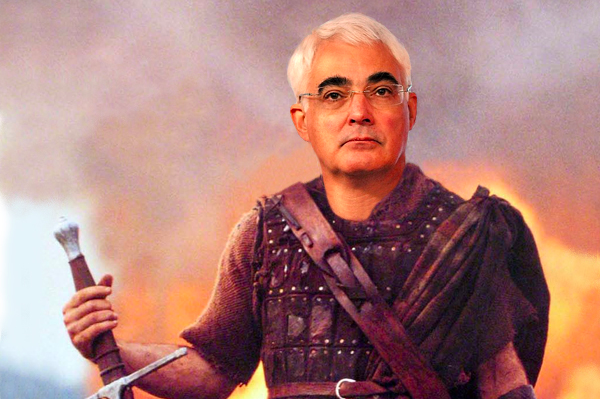When the unionists were looking for a hero to fight Alex Salmond, no one really thought of grey old Alistair Darling. He was the human fire extinguisher, sent into blazing departments to make them so boring that no smoke – or anything else – ever emerged. But now, he is taking a torch to Salmond’s mutating, flaky case for independence. Salmond and David Cameron are expected to sign a deal on Scottish referendum tomorrow, and Darling is itching to get his “yes to the union” campaign started.
On the BBC’s Sunday Politics, he said he is looking forward to cutting through Salmond’s “bluster and the nonsense.” I always suspected Salmond was angling for a compromise, knowing his independence daydream was not shared by those who would have to live with the consequences. This now won’t happen. There will be just one question, which Darling wants set by the Electoral Commission. The wording is crucial: Lord Ashcroft has conducted polling that shows how it changes the answer:-
- “Do you agree Scotland should be an independent country?” Agree 41%, Disagree 59%
- “Do you agree or disagree that Scotland should become an independent country?” Agree 39%, Disagree 61%
- “Should Scotland become an independent country, or should it remain part of the United Kingdom?” Independent 33%, Part of the UK 67%
Darling’s leadership is crucial for two reasons. He fights Salmond’s bluster with cool-headed, non-nonsense logic. Scotland has a tragically long list of problems (especially with inner-city poverty) and Darling can ask: which of these problem would independence solve? His bank manager demeanour is also perfect: it’s hard to argue that Scotland will end up richer when the English subsidy is cut off. Unionists have perhaps relied too much on this argument, but it matters. Darling is a good advocate of this message, as he is perhaps the only finance minister in Europe to emerge from the financial crisis with his reputation enhanced.
Money is a far bigger part of the Scottish question than you might expect. To Kelvin MacKenzie’s delight, kast year’s Scottish Social Attitudes Survey found people’s answers swung on whether they’d be better off – by as little as the price of an iPad. It found that:-
- If independence made Scots on average £500 a year worse off, Scots would vote 21% for, 66% against
- If it made Scots £500 a year better off, they’d vote 65% for, 24% against
- If it left people the same, they’d vote 47% for, 32% against
But as Darling said, the latest polling shows Salmond is down to 28 per cent on even his chosen question. The Olympics, where Jessica Ennis was celebrated as much in Glasgow as in Gateshead, was a wonderful reminder of the power of Britishness. Hilariously, nationalist MPs like Pete Wishart – who used to say there were Scottish but felt no sense of Britishness – are now declaring they are British too. It’s just that they want their government in Edinburgh.
Britishness – and its vast appeal – is an enemy to which the SNP has no answer. This will be a long campaign but the unionists have, in Darling, found just the man to lead it.







Comments